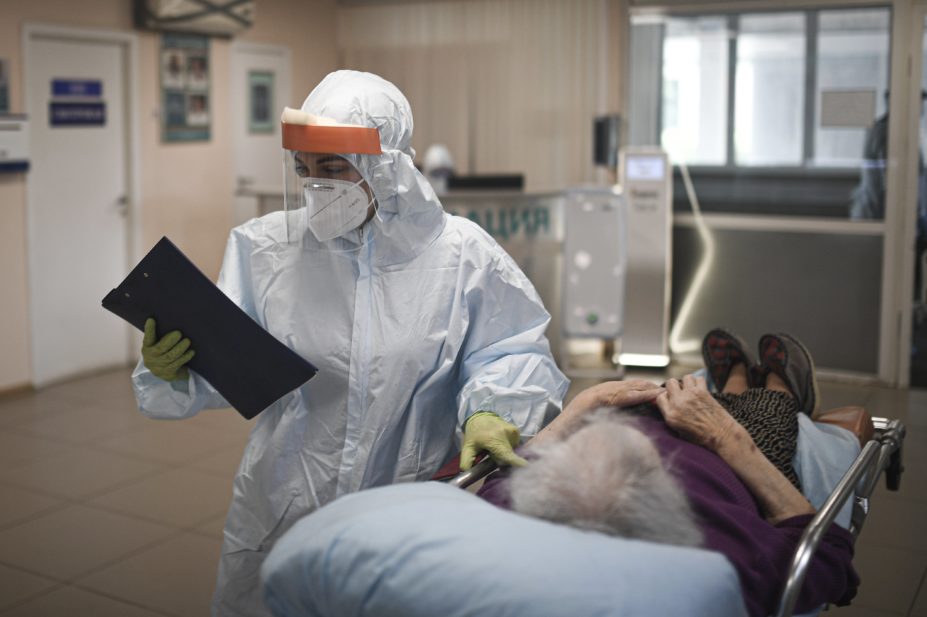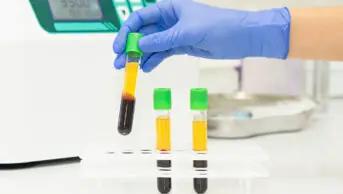
Shutterstock.com
Open access article
The Royal Pharmaceutical Society has made this article free to access in order to help healthcare professionals stay informed about an issue of national importance.
To learn more about coronavirus, please visit: https://www.rpharms.com/resources/pharmacy-guides/wuhan-novel-coronavirus
A small trial investigating the gout treatment colchicine as a treatment for COVID-19 has suggested it reduces the length of both supplemental oxygen therapy and hospitalisation in patients with moderate to severe COVID-19.
The randomised placebo-controlled clinical trial, published in RMD Open on 4 February 2021, involved 72 patients, half of whom received colchicine, while the other half received placebo.
The trial found that patients receiving colchicine were able to abandon oxygen supplementation earlier than those receiving placebo. The median time of need for supplemental oxygen was 4.0 (2.0–6.0) days for the colchicine group and 6.5 (4.0–9.0) days for the placebo group (p<0.001).
The time until discharge followed a similar pattern; the median time of hospitalisation was 7.0 (5.0–9.0) days for the colchicine group and 9.0 (7.0–12.0) days for the placebo group (p=0.003). The drug was also found to be safe and well tolerated.
According to the authors, this was the first randomised controlled trial to test colchicine as a treatment for COVID-19.
“These two primary endpoints have relevance for daily practice in the COVID-19 pandemic, by reducing the length of hospitalisation, consequently diminishing costs and the need for hospital beds,” the authors concluded. “Besides that, the treatment with colchicine is not expensive.”
However, they did highlight that the study size was a limitation and that they were unable to evaluate the capacity of colchicine to avoid admission to intensive care and reduce rates of mortality in patients with COVID-19.
They said that clinical trials with larger numbers of patients should therefore be conducted to further evaluate the efficacy and safety of colchicine as an adjunctive therapy for hospitalised patients with moderate to severe COVID-19.
Early unpublished results from the COLCORONA trial, announced in a press release from the Montreal Heart Institute on 22 January 2021, suggested that colchicine reduced the risk of death or hospitalisations in all 4,488 patients with COVID-19 by 21%, compared with placebo, although the results only “approached” statistical significance.
However, when the researchers analysed just the 4,159 patients whose diagnosis of COVID-19 had been proven by a naso-pharyngeal PCR test, they found that the reductions in the risk of death or hospitalisation compared with placebo were statistically significant. In these patients only, colchicine was found to reduce hospitalisations by 25%, the need for mechanical ventilation by 50%, and deaths by 44%.
The contactless, randomised controlled trial, conducted at home, among around 4,500 COVID-19 patients with at least one risk factor for COVID-19 complications, was designed to determine whether colchicine could reduce the risk of severe complications associated with COVID-19.
On 27 November 2020 it was announced that colchicine would be added to the Randomised Evaluation of COVID-19 Therapy (RECOVERY) trial.
At least 2,500 patients will be randomly allocated to receive the drug, plus usual standard-of-care care. They will be given 1,000 micrograms for the first treatment, then 500 micrograms every 12 hours for a total of 10 days, or until discharge if sooner. Mortality after 28 days will then be assessed, along with impact on hospital stay and the need for ventilation.
“Colchicine is an attractive drug to evaluate in the RECOVERY trial as it is very well understood, inexpensive and widely available,” said Peter Horby, professor of emerging infectious diseases at the Nuffield Department of Medicine at the University of Oxford and co-chief investigator of the RECOVERY trial.
“If it works it would be another COVID-19 treatment that could be used immediately worldwide, even in the poorest countries.”
Depending on recruitment rates, the researchers said it would be “likely to be several months” before there was enough evidence to conclude if colchicine has a significant benefit in COVID-19 patients.
Gino Martini, chief scientist at the Royal Pharmaceutical Society, said: “Although the data look interesting, we need to wait for the UK government-backed RECOVERY trial’s read out so that we have definitive findings for it to be used in non-hospitalised patients with COVID-19.”


